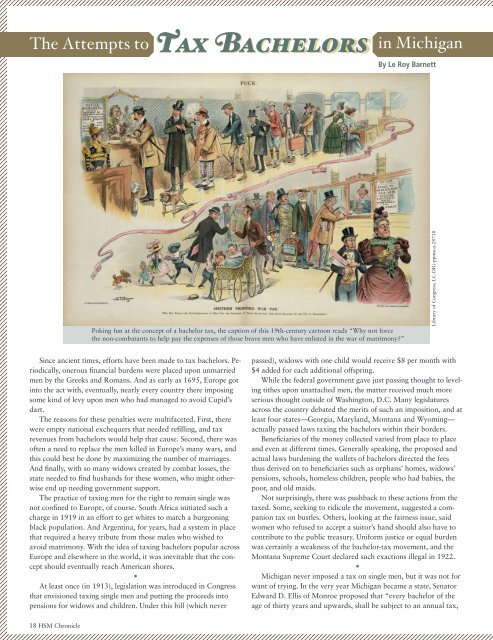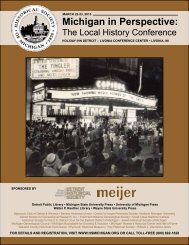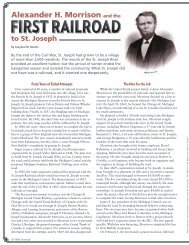The Attempts to Tax Bachelors in Michigan - Historical Society of ...
The Attempts to Tax Bachelors in Michigan - Historical Society of ...
The Attempts to Tax Bachelors in Michigan - Historical Society of ...
Create successful ePaper yourself
Turn your PDF publications into a flip-book with our unique Google optimized e-Paper software.
S<strong>in</strong>ce ancient times, efforts have been made <strong>to</strong> tax bachelors. Periodically,<br />
onerous f<strong>in</strong>ancial burdens were placed upon unmarried<br />
men by the Greeks and Romans. And as early as 1695, Europe got<br />
<strong>in</strong><strong>to</strong> the act with, eventually, nearly every country there impos<strong>in</strong>g<br />
some k<strong>in</strong>d <strong>of</strong> levy upon men who had managed <strong>to</strong> avoid Cupid’s<br />
dart.<br />
<strong>The</strong> reasons for these penalties were multifaceted. First, there<br />
were empty national exchequers that needed refill<strong>in</strong>g, and tax<br />
revenues from bachelors would help that cause. Second, there was<br />
<strong>of</strong>ten a need <strong>to</strong> replace the men killed <strong>in</strong> Europe’s many wars, and<br />
this could best be done by maximiz<strong>in</strong>g the number <strong>of</strong> marriages.<br />
And f<strong>in</strong>ally, with so many widows created by combat losses, the<br />
state needed <strong>to</strong> f<strong>in</strong>d husbands for these women, who might otherwise<br />
end up need<strong>in</strong>g government support.<br />
<strong>The</strong> practice <strong>of</strong> tax<strong>in</strong>g men for the right <strong>to</strong> rema<strong>in</strong> s<strong>in</strong>gle was<br />
not conf<strong>in</strong>ed <strong>to</strong> Europe, <strong>of</strong> course. South Africa <strong>in</strong>itiated such a<br />
charge <strong>in</strong> 1919 <strong>in</strong> an effort <strong>to</strong> get whites <strong>to</strong> match a burgeon<strong>in</strong>g<br />
black population. And Argent<strong>in</strong>a, for years, had a system <strong>in</strong> place<br />
that required a heavy tribute from those males who wished <strong>to</strong><br />
avoid matrimony. With the idea <strong>of</strong> tax<strong>in</strong>g bachelors popular across<br />
Europe and elsewhere <strong>in</strong> the world, it was <strong>in</strong>evitable that the concept<br />
should eventually reach American shores.<br />
•<br />
At least once (<strong>in</strong> 1913), legislation was <strong>in</strong>troduced <strong>in</strong> Congress<br />
that envisioned tax<strong>in</strong>g s<strong>in</strong>gle men and putt<strong>in</strong>g the proceeds <strong>in</strong><strong>to</strong><br />
pensions for widows and children. Under this bill (which never<br />
<strong>Tax</strong> <strong>Bachelors</strong><br />
<strong>The</strong> <strong>Attempts</strong> <strong>to</strong> <strong>in</strong> <strong>Michigan</strong><br />
18 HSM Chronicle<br />
Pok<strong>in</strong>g fun at the concept <strong>of</strong> a bachelor tax, the caption <strong>of</strong> this 19th-century car<strong>to</strong>on reads “Why not force<br />
the non-combatants <strong>to</strong> help pay the expenses <strong>of</strong> those brave men who have enlisted <strong>in</strong> the war <strong>of</strong> matrimony?”<br />
By Le Roy Barnett<br />
passed), widows with one child would receive $8 per month with<br />
$4 added for each additional <strong>of</strong>fspr<strong>in</strong>g.<br />
While the federal government gave just pass<strong>in</strong>g thought <strong>to</strong> level<strong>in</strong>g<br />
tithes upon unattached men, the matter received much more<br />
serious thought outside <strong>of</strong> Wash<strong>in</strong>g<strong>to</strong>n, D.C. Many legislatures<br />
across the country debated the merits <strong>of</strong> such an imposition, and at<br />
least four states—Georgia, Maryland, Montana and Wyom<strong>in</strong>g—<br />
actually passed laws tax<strong>in</strong>g the bachelors with<strong>in</strong> their borders.<br />
Beneficiaries <strong>of</strong> the money collected varied from place <strong>to</strong> place<br />
and even at different times. Generally speak<strong>in</strong>g, the proposed and<br />
actual laws burden<strong>in</strong>g the wallets <strong>of</strong> bachelors directed the fees<br />
thus derived on <strong>to</strong> beneficiaries such as orphans’ homes, widows’<br />
pensions, schools, homeless children, people who had babies, the<br />
poor, and old maids.<br />
Not surpris<strong>in</strong>gly, there was pushback <strong>to</strong> these actions from the<br />
taxed. Some, seek<strong>in</strong>g <strong>to</strong> ridicule the movement, suggested a companion<br />
tax on bustles. Others, look<strong>in</strong>g at the fairness issue, said<br />
women who refused <strong>to</strong> accept a sui<strong>to</strong>r’s hand should also have <strong>to</strong><br />
contribute <strong>to</strong> the public treasury. Uniform justice or equal burden<br />
was certa<strong>in</strong>ly a weakness <strong>of</strong> the bachelor-tax movement, and the<br />
Montana Supreme Court declared such exactions illegal <strong>in</strong> 1922.<br />
•<br />
<strong>Michigan</strong> never imposed a tax on s<strong>in</strong>gle men, but it was not for<br />
want <strong>of</strong> try<strong>in</strong>g. In the very year <strong>Michigan</strong> became a state, Sena<strong>to</strong>r<br />
Edward D. Ellis <strong>of</strong> Monroe proposed that “every bachelor <strong>of</strong> the<br />
age <strong>of</strong> thirty years and upwards, shall be subject <strong>to</strong> an annual tax,<br />
Library <strong>of</strong> Congress, LC-DIG-ppmsca-28718
<strong>to</strong> be paid <strong>in</strong><strong>to</strong> the county treasury, <strong>of</strong> five dollars, for the benefit <strong>of</strong><br />
old maids.” While this 1837 measure failed, it was just the beg<strong>in</strong>n<strong>in</strong>g<br />
<strong>of</strong> an ongo<strong>in</strong>g effort <strong>to</strong> encourage unmarried men <strong>to</strong> perform<br />
what some viewed as their social duty.<br />
In 1848, 40 <strong>Michigan</strong> citizens petitioned the legislature “for the<br />
passage <strong>of</strong> a law tax<strong>in</strong>g old bachelors, for the support <strong>of</strong> <strong>in</strong>digent<br />
females, widows and orphans....” While this request made it <strong>to</strong> a<br />
committee <strong>in</strong> the House <strong>of</strong> Representatives, it was not brought <strong>to</strong> a<br />
vote <strong>in</strong> that chamber.<br />
<strong>The</strong> follow<strong>in</strong>g year, a bill was <strong>in</strong>troduced <strong>in</strong> the House <strong>to</strong> “tax<br />
bachelors for the relief <strong>of</strong> <strong>in</strong>digent widows and orphans,” but<br />
it, <strong>to</strong>o, never made it out <strong>of</strong> committee. In 1850, some men and<br />
women <strong>of</strong> Oakland County petitioned the legislature, “pray<strong>in</strong>g for<br />
the passage <strong>of</strong> a law impos<strong>in</strong>g a tax on that class <strong>of</strong> the lords <strong>of</strong><br />
creation, usually called bachelors, for the education <strong>of</strong> orphan children.”<br />
This overture did not f<strong>in</strong>d a sponsor and thus went nowhere<br />
<strong>in</strong> the House.<br />
<strong>The</strong> costs <strong>of</strong> fight<strong>in</strong>g the Civil War caused legisla<strong>to</strong>rs <strong>to</strong> seek<br />
imag<strong>in</strong>ative ways <strong>of</strong> rais<strong>in</strong>g money <strong>to</strong> pay the bills. One member<br />
<strong>of</strong> the <strong>Michigan</strong> House <strong>in</strong>troduced a bill designed <strong>to</strong> tax bachelors,<br />
but this proposal died <strong>in</strong> committee. Prospects for the measure<br />
would have likely been much brighter had it <strong>in</strong>cluded an exemption<br />
for s<strong>in</strong>gle men serv<strong>in</strong>g <strong>in</strong> the military.<br />
<strong>Michigan</strong>’s efforts <strong>to</strong> make s<strong>in</strong>gle men behave “responsibly” or<br />
suffer the consequences quieted down until 1897, when a bill was<br />
<strong>in</strong>troduced <strong>in</strong> the House <strong>of</strong> Representatives <strong>to</strong> require bachelors<br />
over the age <strong>of</strong> 30 <strong>to</strong> pay an annual tax <strong>of</strong> $5. Another legisla<strong>to</strong>r<br />
threatened <strong>to</strong> <strong>in</strong>troduce “a bill <strong>to</strong> provide a penalty for old maids<br />
refus<strong>in</strong>g <strong>to</strong> accept first proposals from bachelors,” and this produced<br />
a stand<strong>of</strong>f that killed both measures.<br />
•<br />
Despite the objections raised <strong>in</strong> the past, bills tax<strong>in</strong>g bachelors<br />
more than 30 years old were <strong>in</strong>troduced <strong>in</strong> the <strong>Michigan</strong> House<br />
<strong>in</strong> 1901 and 1911. Like their predecessors, these measures died<br />
almost upon arrival <strong>in</strong> the state capi<strong>to</strong>l. If proponents <strong>of</strong> laws penaliz<strong>in</strong>g<br />
s<strong>in</strong>gle men were <strong>to</strong> succeed, they needed additional facts<br />
<strong>to</strong> support their case.<br />
Such evidence was provided by the Kalamazoo Chief <strong>of</strong> Police<br />
<strong>in</strong> 1916. He noted that “90 per cent <strong>of</strong> the crim<strong>in</strong>als <strong>in</strong> Kalamazoo<br />
are bachelors.” He had worked <strong>in</strong> law enforcement for nearly<br />
20 years, and dur<strong>in</strong>g that time, he learned that “it’s the unmarried<br />
man and woman who break the laws; next comes the married<br />
men without children, and then the people with families <strong>to</strong> support.”<br />
<strong>The</strong> police chief observed that there were between six and<br />
seven bachelors for every married man <strong>in</strong> jail, lead<strong>in</strong>g him <strong>to</strong><br />
conclude that if any part “<strong>of</strong> the human family is a menace [<strong>to</strong><br />
society] the bachelor is the class. <strong>The</strong> reason for this is not hard<br />
Dodg<strong>in</strong>g the Bullet<br />
<strong>to</strong> f<strong>in</strong>d. A bachelor is generally selfish” for not tak<strong>in</strong>g responsibility<br />
for a mate.<br />
Armed with this ammunition, advocates <strong>of</strong> the bachelor tax<br />
renewed their efforts <strong>in</strong> 1919. A <strong>Michigan</strong> legisla<strong>to</strong>r announced his<br />
support <strong>of</strong> a bill <strong>to</strong> require men ages 38 <strong>to</strong> 43 <strong>to</strong> pay an annual tax<br />
<strong>of</strong> 50 cents and men between ages 43 and 48 <strong>to</strong> pay 20 cents each<br />
year. <strong>The</strong>re were exceptions, however, as he noted that “widowers<br />
between the ages <strong>of</strong> 30 and 40 and men who have obta<strong>in</strong>ed<br />
divorces will not be subject <strong>to</strong> the tax.”<br />
<strong>The</strong> purpose <strong>of</strong> the contemplated law was not just <strong>to</strong> sic the tax<br />
collec<strong>to</strong>r on s<strong>in</strong>gles, but also <strong>to</strong> encourage romance. <strong>The</strong> sponsor <strong>of</strong><br />
the measure said that “<strong>in</strong> order <strong>to</strong> stimulate <strong>in</strong>terest <strong>in</strong> matrimony,”<br />
his submission provided that “any person subject <strong>to</strong> the provisions<br />
<strong>of</strong> [his] bill who marries, shall be paid a bonus <strong>of</strong> $2...”<br />
This 1919 version <strong>of</strong> the bachelor levy did not ga<strong>in</strong> traction, so<br />
another attempt was made <strong>in</strong> the next session <strong>of</strong> the <strong>Michigan</strong> Legislature.<br />
Thus, <strong>in</strong> 1921, a resolution was proposed <strong>in</strong> the House <strong>to</strong><br />
place “a tax <strong>of</strong> $50 on old maids above the age <strong>of</strong> 28 and $100 on<br />
bachelors above that age, the proceeds <strong>to</strong> be used for the retirement<br />
<strong>of</strong> [veterans’] bonus bonds.” <strong>The</strong>re was absolutely no support for<br />
this measure, and it was promptly buried by lawmakers.<br />
•<br />
<strong>The</strong> last known attempt <strong>to</strong> place a <strong>Michigan</strong> duty on marriagefree<br />
men came <strong>in</strong> 1935. In that year, a bill was <strong>in</strong>troduced declar<strong>in</strong>g<br />
that “all bachelors <strong>in</strong> this state <strong>of</strong> 21 years <strong>of</strong> age and upwards,<br />
except <strong>in</strong>mates <strong>of</strong> state and municipal <strong>in</strong>stitutions, shall pay an annual<br />
tax <strong>of</strong> ten dollars.” <strong>The</strong> measure went on <strong>to</strong> say that one-half<br />
<strong>of</strong> the funds derived would “be credited <strong>to</strong> the mothers’ pension<br />
fund and one-half...<strong>to</strong> the fund for the care <strong>of</strong> dependent children.”<br />
Realiz<strong>in</strong>g that such an imposition would not be popular, the<br />
measure conta<strong>in</strong>ed penalties for those <strong>in</strong>dividuals who tried <strong>to</strong><br />
avoid payment. <strong>The</strong> bill ended by warn<strong>in</strong>g that “any bachelor<br />
fail<strong>in</strong>g <strong>to</strong> register as provided <strong>in</strong> this act shall be deemed guilty <strong>of</strong><br />
a misdemeanor and upon conviction shall be liable <strong>to</strong> a f<strong>in</strong>e not<br />
exceed<strong>in</strong>g one hundred dollars or imprisonment <strong>in</strong> the county jail<br />
for a period not exceed<strong>in</strong>g 90 days, or both....”<br />
This bill came dur<strong>in</strong>g the depths <strong>of</strong> the Great Depression. A<br />
large percent <strong>of</strong> <strong>Michigan</strong>ders were liv<strong>in</strong>g on the marg<strong>in</strong>s and,<br />
with very little <strong>in</strong>come, many could not afford <strong>to</strong> get married even<br />
if they wanted <strong>to</strong> do so. Given the fact that many men <strong>in</strong> the state<br />
were bachelors due <strong>to</strong> economic conditions and not choice, there<br />
was no support for the measure and it was quickly dispensed with.<br />
By now, the proponents <strong>of</strong> assess<strong>in</strong>g bachelors had been at it <strong>in</strong><br />
<strong>Michigan</strong> for nearly a century, and at no time <strong>in</strong> their struggle did<br />
they even come close <strong>to</strong> realiz<strong>in</strong>g their ambitions. Succeed<strong>in</strong>g<br />
legislatures have apparently taken note <strong>of</strong> this fact and, for the past<br />
77 years, have avoided try<strong>in</strong>g <strong>to</strong> be matchmakers between s<strong>in</strong>gle<br />
men and state tax collec<strong>to</strong>rs.<br />
A common fac<strong>to</strong>r between many <strong>of</strong> the bachelor taxes <strong>in</strong> European his<strong>to</strong>ry was that a man could avoid be<strong>in</strong>g taxed<br />
under certa<strong>in</strong> circumstances. For example, <strong>in</strong>dividuals who had physical disabilities, were <strong>in</strong> prison, or had mental illnesses<br />
were <strong>of</strong>ten exempt from hav<strong>in</strong>g <strong>to</strong> pay a penalty for their s<strong>in</strong>gledom. Others could avoid be<strong>in</strong>g charged if they<br />
were able <strong>to</strong> prove that they had asked a woman <strong>to</strong> marry them and been rejected.<br />
<strong>The</strong> provision giv<strong>in</strong>g a tax waiver <strong>to</strong> men who’d been star-crossed <strong>in</strong> love gave rise <strong>to</strong> what were called “pr<strong>of</strong>essional<br />
lady rejec<strong>to</strong>rs.” <strong>The</strong>se were women who—for a modest sum or favors—agreed <strong>to</strong> swear <strong>to</strong> authorities that a particular<br />
<strong>in</strong>dividual had proposed <strong>to</strong> them and they had spurned his <strong>of</strong>fer <strong>of</strong> marriage.<br />
HSM Chronicle 19







